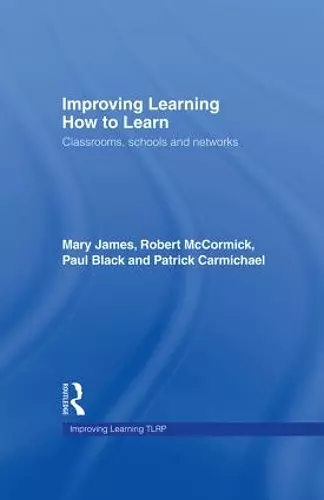Improving Learning How to Learn
Classrooms, Schools and Networks
John Macbeath author Paul Black author Bethan Marshall author Alison Fox author Patrick Carmichael author Robert McCormick author Mary Jane Drummond author Mary James author
Format:Hardback
Publisher:Taylor & Francis Ltd
Published:11th Oct '07
Currently unavailable, and unfortunately no date known when it will be back
This hardback is available in another edition too:
- Paperback£44.99(9780415404273)

Learning how to learn is an essential preparation for lifelong learning. Whilst this is widely acknowledged by teachers, they have lacked a rich professional knowledge base from which they can teach their pupils how to learn.
This book makes a major contribution to the creation of such a professional knowledge base for teachers by building on previous work associated with ‘formative assessment’ or ‘assessment for learning’ which has a strong evidence base, and is now being promoted nationally and internationally. However, it adds an important new dimension by reporting the conditions within schools, and across networks of schools, that are conducive to the promotion, in classrooms, of learning how to learn as an extension of assessment for learning.
There is a companion book, Learning How to Learn in Classrooms: Tools for schools (also available from Routledge), which provides practical resources for those teachers looking to put into practice the principles covered in this book.
"The researchers explicitly invite others into the discussion of the role of assessment in helping students learn how to learn. They achieve this goal well and early on. Their text is refreshingly readable and an illustration of the pedagogy they propose."--Teaching Theology and Religion, April 2010, 183-184
‘Learning how to learn is an area of education very much at the top of both the policy and practice agenda right now as it connects with the Government’s ‘Personalised Learning’ strategy and with the prominence of assessment for learning in the national primary and Key Stage 3 strategies. However, it is not an area likely to subside once the national priorities move on elsewhere since teachers will always remain concerned with the best ways of enhancing learning. While there is an established literature in the field of assessment for learning, the proposed book offers a unique evidence base of exceptionally high quality to inform practitioners and policy makers about the links between classroom, school and network levels. This has not hitherto been addressed.
The main market will be teachers and school managers throughout the school system - of which there are thousands. The second main area will be those working at local, regional and national level to support schools - local authority advisers, teacher trainers, consultants, etc - upper hundreds or lower thousands. There will be a strong market in other countries since the issue of learning to learn is not culture specific though there are culturally related challenges in implementing these strategies effectively.
The book would be recommended reading on the PGCE and Graduate Teacher Programme – thousands. Also on Masters, doctoral and in-service programmes where relevant - hundreds.
There are no absolutely direct competitors in that there is no other large scale research that has provided evidence from the primary and secondary sectors regarding strategies for implementing learning to learn and how the culture of the school and networking between schools can support or inhibit this process.
The authors are the most highly recognised authorities in this field. In the case of James, Black, MacBeath and Wiliam, this is true internationally as well as nationally. I strongly recommend that this book is published.’ Professor Judy Sebba, University of Sussex (previously worked for the DfES)
‘Assessment for learning is a national agenda for schools and I believe learning how to learn will become more important in the future as part of the national agenda. The principal markets would be in the UK, US and international. The content of the book would appeal to students, teachers, school leaders, teacher educators, advisors consultants, and anyone else with an interest in learning how to learn. I would expect it to become a main text or at least recommended reading for postgraduate and continuing professional development courses. The author(s)/editor(s) have written widely on the subject of assessment and professional development and are recognised authorities nationally and internationally.’ Janet English, Head teacher, Malvern Way Infant and Nursery School
ISBN: 9780415404266
Dimensions: unknown
Weight: 650g
264 pages